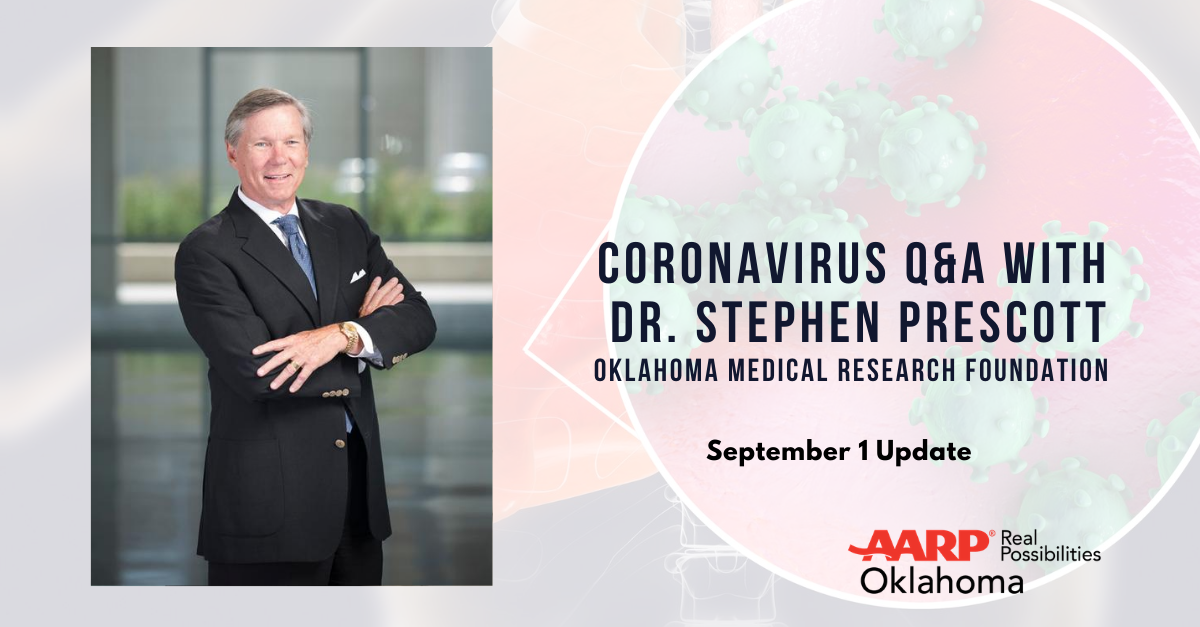AARP Hearing Center

Dr. Stephen Prescott, Oklahoma Medical Research Foundation president, answers your medical questions about coronavirus and COVID-19.
With the kids going back to school, would you advise us to keep them away from grandparents and older relatives?
“In general, yes, unfortunately. As a grandfather myself, I know how hard that can be, but the truth of the matter is that folks in our particular age group are at high risk for bad Covid-19 outcomes. Kids, meanwhile, are now in high-risk environments by returning to school. It’s really not a good mix. I know this is difficult and, in some cases, impossible to avoid, but I would stress using extreme caution and all possible safety measures.”
People are, understandably, anxious right now. When does worry cross over to something else? What are the warning signs we should look for in others and ourselves?
“With the pandemic and a number of other things happening in the world, there are people who will spiral into depression. Many of us have been forced to change our daily routines entirely, and that can take a mental toll as we all struggle to adjust to a new reality. Adapting can be harder for some than others, and there are signs you should all look for in friends and loved ones. Is a loved one avoiding others? Not answering the phone? Constantly focused on the negatives and intensely sad or morose? These are all common changes that are hard to recognize in ourselves, so we need to pay attention to these subtle signs in the people we care about. We are all worried out our physical health right now, but mental health is incredibly important as well. The good news is there’s plenty you can do for yourself and for others: Be kind, call someone to see how they’re doing, take a break from scrolling social media, avoid alcohol, maintain a routine – just to name a few.”
Is the recent news accurate which states “neck gaiters” are ineffective as protective face coverings?
“There’s no question about it. They’re not nearly as good as a proper mask. In fact, a recent study suggests they could be worse than no mask at all. The same can be said for bandanas or any other mask substitute that doesn’t fit around the upper nose well or achieve a proper seal. They let more air flow, which is why they’re more comfortable. But comfort isn’t a good thing when it comes to masks that stop the virus.”
What steps should I be taking to ensure I am washing my hands properly?
“Handwashing is certainly one of the most effective ways to protect yourself and your family from getting sick. It’s not how long your wash them or any magic formula. It really comes down to the thoroughness and the frequency. Did the soap (or hand sanitizer) cover your hands, get between your fingers and all around the nails? And are you doing it regularly? Those are really the keys. Just be consistent and vigilant.”
What are the implications of the upcoming flu season as it relates to COVID-19?
“I have two outlooks. The pessimist in me thinks it’s going to be potentially really problematic. Namely, the two viruses have similar symptoms that will lead to confusion in diagnosis and increase the demand on an already strained healthcare system. People becoming sick with both at the same time is inevitable, and that’s a particularly scary prospect for those who are immunocompromised or already facing respiratory issues. However, the optimist in me says if we do a good job getting vaccinated for the flu this season and we continue to take Covid precautions — physical distancing, mask-wearing, handwashing — then we could actually see a reduction in flu cases this year. Influenza spreads similarly to Covid, only it’s not as infectious.”
Once a vaccine is available, what is the timeframe it will take to develop an immune response?
“From the time a patient gets vaccinated, which will come in the form of an initial shot and then a second one several weeks later, there will be an immune response within a few weeks. It looks very likely to me that the most promising Covid-19 vaccines will be safe and effective. The next step is addressing the question: Do they prevent Covid? Those studies are underway, and I’m optimistic they’ll find the vaccines work. I’m also optimistic we will see one or more receive FDA approval before the end of the year.”
Related articles:
Coronavirus Q&A with Dr. Stephen Prescott: August 24 Update
Coronavirus Q&A with Dr. Stephen Prescott: August 4 Update
Coronavirus Q&A with Dr. Stephen Prescott: July 24 Update
Coronavirus Q&A with Dr. Stephen Prescott: April 28 Update
Coronavirus Q&A with Dr. Stephen Prescott: April 9 Update
Coronavirus Q&A with Dr. Stephen Prescott: April 2 Update
Coronavirus Q&A with Dr. Stephen Prescott: March 26 Update
AARP and coronavirus
AARP has been working to promote the health and well-being of older Americans for more than 60 years. In the face of this pandemic, AARP is providing information and resources to help older people and those caring for them protect themselves from the virus and prevent it spreading to others. AARP is compiling facts and resources about coronavirus and how you can protect yourself. We’re updating this information as rapidly as we can to ensure our AARP members have the information they need at www.aarp.org/coronavirus.































































